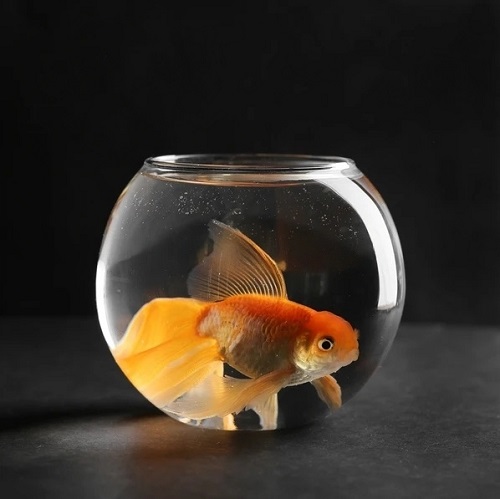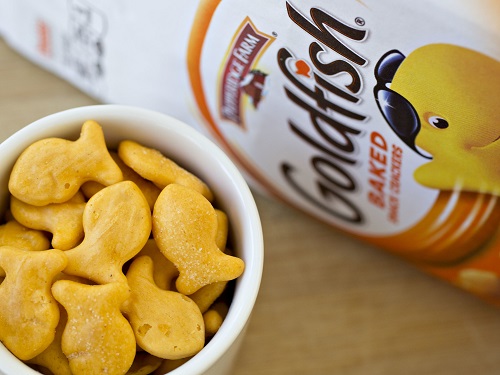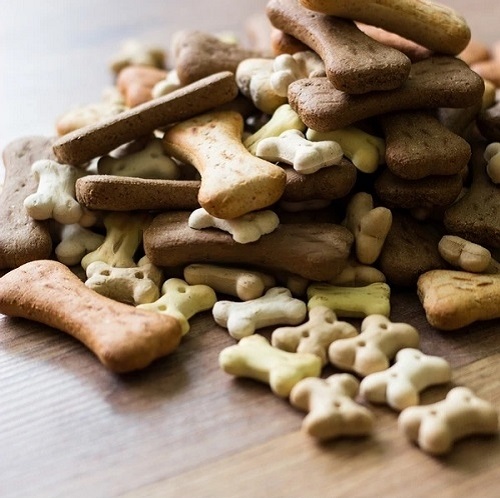Can Dogs Eat Goldfish? Read on to find out if your furry friend can snack on these shimmering delights safely!
In this short but informative article, we will explore about-Can Dogs Eat Goldfish? However, it is not a common phenomenon for a dog to eat a goldfish, but it is always safe to stay informed to handle cases of accidental ingestions!
What is a Goldfish?

A goldfish is a popular freshwater fish that belongs to the carp family. It is native to East Asia but has been widely domesticated and kept as a pet worldwide. Goldfish are known for their bright and vibrant colors, with various shades of gold, orange, red, and white being the most common.
They have a distinct body shape with a streamlined appearance, protruding eyes, and often have a long, flowing tail. Goldfish are popular aquarium pets due to their beauty and relatively easy care requirements. Goldfish are omnivorous and feed on a diet consisting of both plant matter and small aquatic creatures.
Can Dogs Eat Fish Sticks? Learn here
Can Dogs Eat Goldfish?
No, Dogs should not eat Goldfish!
While goldfish are not toxic to dogs, they are not a suitable food for them. Goldfish are typically high in fats and can be difficult for dogs to digest properly. If you have any concerns about your dog’s diet or health, it’s best to consult with a veterinarian.
Can Dogs Eat Goldfish Crackers?

No, Dogs Cannon Eat Goldfish Crackers!
Goldfish crackers are typically made with wheat flour, cheese, and various seasonings. Dogs, being carnivores, have different dietary requirements compared to humans. Their digestive systems are not designed to process carbohydrates like those found in goldfish crackers efficiently. These crackers are not formulated with a dog’s nutritional needs in mind and often contain ingredients that may not be suitable for their digestion or overall health. It’s best to avoid feeding Goldfish crackers to your dog and opt for dog-specific treats instead.
Are Goldfish Bad for Dogs—Health Concerns
Yes, goldfish is bad for dogs and should not be fed deliberately. It can pose several health concerns:
- Digestive Upset: Goldfish are high in fats and may be difficult for dogs to digest properly. Consuming fatty foods can lead to gastrointestinal distress, including diarrhea, vomiting, and pancreatitis.
- Chemical Exposure: Goldfish bred in commercial environments may be exposed to chemicals, pesticides, or medications.
- Parasites and Infections: It can carry parasites, bacteria, or viruses, such as salmonella, that can be harmful to dogs. If a dog consumes a contaminated goldfish, it can lead to gastrointestinal infections or other health issues.
- Choking Hazard and Intestinal Blockage: Goldfish have small bones that can pose a choking hazard to dogs. If a dog swallows a goldfish without properly chewing it, the bones can cause obstructions or blockages in the gastrointestinal tract, requiring surgical intervention.
Check out Can Dogs Eat Croutons here
How Many Goldfish Can a Dog Eat?
Dogs should not be intentionally fed goldfish as a regular part of their diet. While a small accidental ingestion of a goldfish is unlikely to cause significant harm, intentionally feeding goldfish to a dog can lead to health issues. The number of goldfish a dog can eat without adverse effects can vary based on factors such as the size of the dog, the size of the goldfish, and the dog’s individual digestive system.
It’s best to provide dogs with a diet specifically formulated to meet their nutritional needs, as recommended by veterinarians. If you suspect your dog has consumed goldfish or is experiencing any health concerns, consult with a veterinarian for proper guidance and care.
Goldfish Alternatives for Dogs

Serve your dog with such alternatives that will fill up their appetite and provide the essential nutrients to ensure your pet doesn’t get lured to gulp down a goldfish. Some suitable options are as follows:
- Dog Treats: Opt for commercially available dog treats specifically formulated for dogs. Look for treats made with high-quality ingredients and designed to meet your dog’s nutritional needs.
- Fish-Based Dog Food: Choose a dog food that contains fish as a protein source. Look for reputable brands that offer balanced and complete fish-based formulas to ensure your dog gets the necessary nutrients.
- Cooked Fish: Cooked fish such as salmon, trout, or white fish (without seasoning) can be a healthy and safe option for dogs. Make sure to remove any bones and avoid using seasonings or oils that can be harmful to dogs.
- Fresh Fruits and Vegetables: Many dogs enjoy a variety of fruits and vegetables as treats. Apples, carrots, blueberries, and green beans are generally safe and can provide added nutrients to their diet.
- Vet-Approved Treats: Consult with your veterinarian for recommendations on specific treats or snacks that are appropriate for your dog’s breed, age, and dietary requirements.
Remember to introduce new foods gradually and in moderation, and always monitor your dog for any adverse reactions. It’s important to provide a balanced diet and consult with a veterinarian for personalized advice on your dog’s nutritional needs.
Check out Dogs Treats for Sensitive Stomachs here
Quick Takeaways
Dogs should not eat goldfish as a regular part of their diet. While small accidental ingestions are unlikely to cause significant harm, intentionally feeding goldfish to dogs can lead to digestive issues, potential exposure to harmful chemicals, choking hazards, and nutritional imbalances.
To ensure your dog’s health and well-being, stick to a balanced and appropriate diet formulated specifically for dogs. If you have any concerns about your dog’s diet or health, consult with a veterinarian for professional guidance and care.
FAQs
1. Can Dogs Eat Goldfish Snacks?
Goldfish snacks often contain high levels of sodium, artificial flavors, and other ingredients that may not be suitable for dogs. It’s best to stick to dog-specific treats that are safe and formulated for their dietary requirements.
2. Can Dogs Eat Cheddar Goldfish?
Cheddar Goldfish, like other flavored varieties, are not suitable for dogs. While cheddar cheese itself is not toxic to dogs, the additional ingredients and seasonings in cheddar Goldfish may not be appropriate for their digestion or overall health. It’s best to avoid feeding cheddar Goldfish to your dog and opt for dog-friendly treats instead.
3. Can Dogs Eat Flavor Blasted Goldfish?
Flavor Blasted Goldfish, like other flavored varieties, are not recommended for dogs. These snacks often contain artificial flavors, high sodium levels, and other ingredients that may not be suitable for your dog’s health. It’s important to prioritize a balanced and appropriate diet for your dog, tailored to its specific nutritional needs.
4. Can Dogs Eat Pepperidge Farm Goldfish?
These snacks are not formulated with the nutritional requirements of dogs in mind. They often contain ingredients that may not be suitable for your dog’s digestion or overall health. It’s best to look for treats specifically designed for dogs to ensure their well-being.
5. Can Dogs Eat Pizza Goldfish?
Pizza Goldfish, like other flavored varieties, are not suitable for dogs. It’s best to avoid feeding pizza Goldfish to your dog and provide them with appropriate dog treats instead.
6. Can Dogs Eat Pretzel Goldfish?
Pretzel Goldfish, while not toxic to dogs, is not recommended as a regular treat. They are often high in salt, which can be harmful to dogs in excessive amounts. Additionally, the crunchy texture of pretzels may pose a choking hazard or lead to digestive issues. It’s best to choose safer and healthier treats specifically made for dogs.
